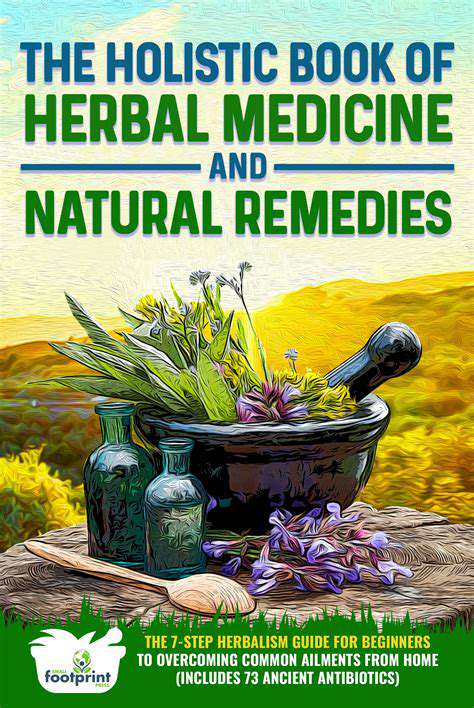Ayurvedic Practices for Seasonal Allergies
The interplay between the doshas and the seasons is a key aspect of Ayurvedic medicine. For example, increased Vata energy during the transition from summer to fall can exacerbate dryness and sensitivity, potentially contributing to allergy symptoms. Conversely, Pitta imbalances during the warmer months can lead to increased inflammation, increasing susceptibility to allergic reactions. A deep understanding of these seasonal fluctuations, combined with an awareness of your individual dosha, forms the bedrock of Ayurvedic allergy management.
The Role of Seasonal Changes in Ayurvedic Medicine
Ayurveda recognizes the cyclical nature of seasons and their impact on the body. Each season brings with it unique energies and environmental conditions that can affect the body's equilibrium. Spring, with its blooming flowers and increasing pollen counts, is often a time of heightened allergies. This is because the shifting energies from winter to spring can disrupt the balance of the doshas, making the body more susceptible to external allergens.
Furthermore, the change in weather patterns, including temperature fluctuations and increased humidity, can also influence the severity of allergic responses. Ayurvedic principles emphasize the importance of adapting to these seasonal shifts to maintain overall health. Recognizing the specific energy of each season allows for proactive measures to support the body's natural ability to regulate itself and minimize the impact of allergies.
Ayurvedic Practices for Managing Seasonal Allergies
Ayurvedic practices offer a holistic approach to managing seasonal allergies, moving beyond just symptom relief. These practices focus on restoring balance within the body, addressing the root causes of the allergies, and strengthening the immune system. Diet plays a critical role, with emphasis on foods that support the body's natural defenses and reduce inflammation. This includes incorporating fresh, seasonal fruits and vegetables, while avoiding overly processed foods, spicy foods, and heavy, fried foods, which can further aggravate the body's sensitivity.
Lifestyle modifications are also integral to Ayurvedic allergy management. Regular exercise, proper sleep, and stress reduction techniques, such as meditation and yoga, are all crucial in maintaining overall health and resilience to allergens. Ayurvedic therapies, such as herbal remedies and specialized massages, can also be incorporated to support the body's natural healing process and alleviate specific symptoms. These comprehensive approaches aim to balance the doshas, strengthen the immune system, and promote overall well-being.
Dietary Adjustments for Allergy Relief
A key aspect of Ayurvedic allergy management involves dietary adjustments tailored to the individual's dosha and the current season. For example, during allergy season, an individual with a Vata-predominant constitution might benefit from incorporating warming spices and foods like ginger, cinnamon, and turmeric. These can help to counteract the drying effects of the season and support the body's natural defenses. A Pitta-predominant constitution may benefit from cooling foods like cucumber, leafy greens, and fruits like berries to reduce inflammation. In contrast, Kapha individuals might find relief in foods that stimulate digestion and help to eliminate excess mucus, such as citrus fruits and pungent vegetables.
Ayurveda emphasizes the importance of eating fresh, whole foods and avoiding processed foods, sugar, and caffeine, which can further exacerbate allergy symptoms. The practice also suggests incorporating seasonal fruits and vegetables, as they are naturally aligned with the body's energy needs during each phase of the year, further supporting overall health and minimizing allergic reactions. This personalized approach to diet empowers individuals to tailor their eating habits to their unique needs and support their body's natural ability to combat allergies effectively.
Lifestyle Adjustments for Optimal Wellness

Prioritizing Physical Activity
Incorporating regular physical activity into your daily routine is crucial for overall well-being and can lead to significant improvements in your physical and mental health. Engaging in at least 150 minutes of moderate-intensity aerobic activity per week, such as brisk walking or cycling, is generally recommended. This doesn't mean you need to join a gym or become a marathon runner overnight. Small, consistent steps, like taking the stairs instead of the elevator, or parking further away from your destination, can add up to make a real difference in your activity level.
Finding activities you genuinely enjoy is key to maintaining consistency. Whether it's dancing, swimming, hiking, or simply playing with your children or grandchildren, the more you enjoy the activity, the more likely you are to stick with it. Physical activity not only strengthens your muscles and bones but also boosts your mood and energy levels, contributing to a more positive and productive lifestyle.
Nourishing Your Body with Healthy Food Choices
Making conscious food choices is essential for maintaining optimal health and well-being. Prioritizing whole, unprocessed foods like fruits, vegetables, lean proteins, and whole grains provides your body with the essential nutrients it needs to function optimally. This means limiting processed foods, sugary drinks, and excessive amounts of saturated and unhealthy fats.
A balanced diet rich in vitamins, minerals, and antioxidants will support your immune system and help prevent chronic diseases. Focus on incorporating a variety of colors into your meals, as different fruits and vegetables offer a wide range of nutrients. Reading food labels and understanding portion sizes will also help you make informed choices that align with your health goals.
Cultivating Mindfulness and Stress Management Techniques
In today's fast-paced world, stress is a prevalent issue that can significantly impact our physical and mental well-being. Developing effective stress management techniques can significantly improve your quality of life. These techniques can include mindfulness practices, deep breathing exercises, or engaging in hobbies and activities that bring you joy and relaxation.
Taking time for yourself to relax and unwind is crucial. Whether it's spending time in nature, listening to music, reading a book, or practicing yoga, incorporating these activities into your routine can help you manage stress effectively. Regular stress reduction techniques can lead to improved sleep quality, reduced anxiety, and enhanced overall mental clarity.
Herbal Remedies for Seasonal Allergy Relief in Ayurveda
Understanding Seasonal Allergies in Ayurveda
Ayurveda views seasonal allergies not as a disease, but as an imbalance within the body's doshas. These imbalances, often exacerbated by environmental factors like pollen and dust, can lead to symptoms like sneezing, runny nose, and itchy eyes. Understanding the underlying principle of dosha imbalance is crucial for effective Ayurvedic treatment, as it allows for a personalized approach to healing that addresses the specific needs of each individual.
Different seasons can trigger different dosha imbalances. For example, springtime, with its blooming flowers and increased pollen count, can often disrupt the Vata dosha, leading to heightened sensitivity and allergy symptoms. Ayurveda emphasizes the importance of adjusting one's lifestyle and diet to harmonize the doshas during these periods.
Identifying Your Predominant Dosha
Before exploring herbal remedies, it's essential to determine your predominant dosha. This is because different herbs work best for different doshas. A qualified Ayurvedic practitioner can help you identify your dosha through a consultation that includes a discussion of your lifestyle, diet, and health history. This personalized assessment is crucial for selecting the most effective remedies.
Herbal Remedies for Vata Dosha
If you are predominantly Vata, your body may be more susceptible to seasonal allergies. Ayurvedic herbs known for balancing Vata include ashwagandha, which is known for its adaptogenic properties and stress-reducing benefits. It can help to calm the nervous system, which is often out of balance when experiencing Vata imbalance. In addition, Brahmi is known for its ability to improve focus and memory, which can be helpful for those experiencing mental fog associated with seasonal allergies.
Herbal Remedies for Pitta Dosha
For those with a predominantly Pitta dosha, herbs that cool and soothe the body are often recommended. Tulsi, a well-known herb in Ayurveda, is known for its cooling and anti-inflammatory properties, helping to reduce inflammation associated with allergy symptoms. Also, licorice root is another effective herb that can help balance Pitta by reducing heat and inflammation in the body. The cooling and calming properties of these herbs can help alleviate allergy symptoms.
Herbal Remedies for Kapha Dosha
If your predominant dosha is Kapha, you might experience seasonal allergies with a sluggishness and congestion. Herbs that promote lightness and dryness can be beneficial. Ginger, with its warming and stimulating properties, can help to clear congestion and promote a sense of lightness. Additionally, cinnamon, known for its warming and antiviral properties, can help to stimulate the immune system and reduce the severity of allergy symptoms.
Lifestyle Adjustments for Allergy Relief
Ayurvedic practices extend beyond herbal remedies. A healthy lifestyle plays a vital role in managing seasonal allergies. This includes maintaining a balanced diet rich in fresh fruits, vegetables, and whole grains. Regular exercise and stress reduction techniques, like meditation or yoga, can also help to maintain a harmonious balance within the body's doshas, making you less susceptible to allergy symptoms. Proper hydration is also key for maintaining overall health, especially during allergy season.
Consulting an Ayurvedic Practitioner
While these herbal remedies offer potential benefits, it's crucial to consult with a qualified Ayurvedic practitioner before incorporating them into your routine. They can assess your specific needs and recommend the most appropriate herbs and treatment strategies. They can also advise on dosage and potential interactions with other medications you may be taking. This personalized approach ensures that you receive the most effective and safe Ayurvedic treatment for your seasonal allergies.












